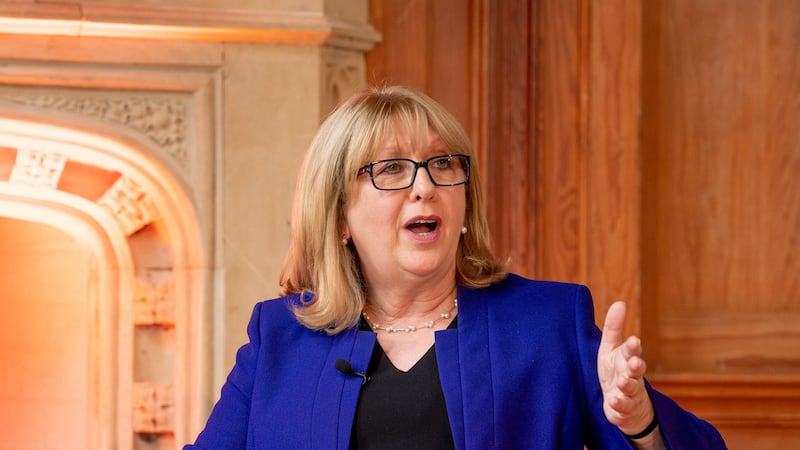Brexit ushered in the period of greatest constitutional upheaval for 50 years, prompting corresponding momentum in the effort to secure Irish unity.
The so-called decade of opportunities was said to offer the potential for a border poll by 2030 and an accompanying surge in support for ending more than 100 years of partition.
The new year marks the halfway point in the decade, and as 2025 dawns it’s arguable the prospect of a unity referendum is no closer than it was five years ago, with the Labour administration in London so far ensuring greater constitutional stability than its Brexiteer predecessor.
A disappointing general election for Sinn Féin in the Republic, which will see it excluded from the next Fianna Fáil-Fine Gael-led government, may also be regarded as a setback for the unity project.
But Sinn Féin’s Declan Kearney isn’t downbeat, pointing to the “new vista of opportunities” emerging across the island.
“For the first time all of the main political parties contesting the southern general election had a section of their manifestos relating to constitutional change,” he says.
The Sinn Féin national chairperson points to “landmark remarks” by former taioseach Leo Varadkar in September in which he said Irish unity should be an objective, not just an aspiration.

“The opportunity now is for us to collectively encourage those parties which form the next government to ensure that Irish unity does indeed become a policy and political objective in the next programme for government,” Mr Kearney says.
He believes the former Fine Gael leader’s comments and the manifesto pledges, coupled with July’s report from the cross-party Oireachtas Joint Committee on the Implementation of the Good Friday Agreement, are evidence of a “political consensus that has emerged, particularly over the last 12 months”.
The South Antrim MLA says there is now an opportunity for “new conversations” which are “elevated above adversity between parties”.
He argues that a referendum within the next five years is still possible and that there is now a responsibility on the two governments to establish a roadmap for a border poll, the first stage of which is the British government setting out the criteria that would trigger it – something it appears reluctant to do.
Colum Eastwood, who since stepping down as SDLP leader in October has committed more time and energy to the party’s New Ireland Commission, has always been loath to put a timeframe on a border poll because “we end up in the wrong arguments”.
The Foyle MP nonetheless believes there is a “new political context which gives us an opportunity to do things” but says there won’t be a referendum within the mandate of the current British government.

“We shouldn’t get fixated on a date – we should ultimately be focused on doing the work to make sure that we can win over that 20-25% in the middle who are undecided,” he says.
Many of the issues around Brexit may be resolved but Mr Eastwood believes it continues to influence politics.
“Not long ago we were part of EU and all that goes with that in terms of trade but we’re now attached to what is becoming a diminished state, the UK, and a more inward-looking society, when the rest of the island is moving on, with a more liberal society and economy, which is thriving as a result.”
The former SDLP leader too senses a change in mood in Dublin, a tactic which may well be motivated by a desire by the main coalition partners to nullify one of Sinn Féin’s key points of difference.
“We’re all a bit sick of the rhetoric around this; people want to see action, and I think that’s beginning to happen,” says Mr Eastwood.
“I sense a definite change in the more established parties in the south who are going to form the next government.”
For economist John FitzGerald, Irish unity is at least a generation away. Describing himself as “neutral” on the constitutional question, the son of former taoiseach Garret FitzGerald believes there is “zero” prospect of a border poll in the next decade and if there were, it’s likely the Republic’s electorate would vote ‘No’.
He argues that before people in the south would agree to unification it’s necessary “to make Northern Ireland work”. It would be a “disaster”, he says, for the north to vote for unity but for the Republic to reject it.
Mr FitzGerald says impediments to unity include “infrastructure deficits” but argues that ending the “right-wing, Thatcherite” policy of academic selection is the key to securing the support of southern voters for a united Ireland.
Andrée Murphy of Ireland’s Future believes we have seen the “legitimacy and the normalisation of the constitutional debate” since Brexit and that it’s now part of the mainstream political discourse. She highlights former president Mary McAleese’s participation in a conference on unity organised by the National Women’s Council of Ireland as illustrative of “how the ground has shifted”.

She is reluctant to rule out a referendum by the decade’s end and believes “we’ll see dates and conversations about dates happening within that within this term of the next government”.
“W need to have timetables and we need to identify what the formal processes are,” she says.
“Civil society and a nation will move ahead of the government, who will then catch up, and I think you’re seeing a bit of that at the minute.”







